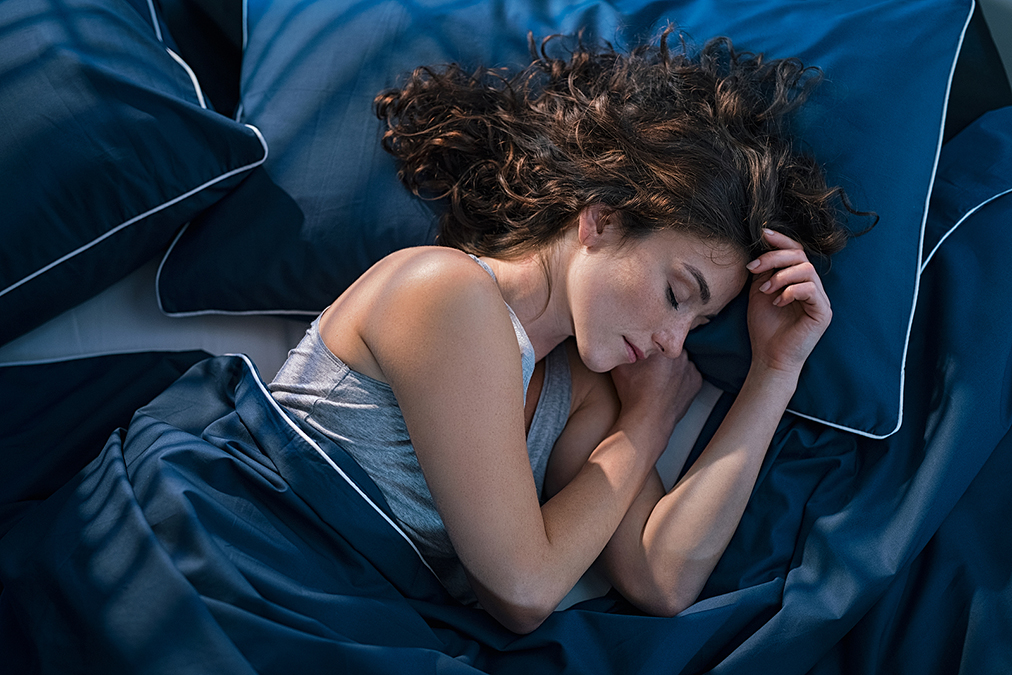 Most common recommendations to avoid osteoporosis include an improved diet and exercising.
Most common recommendations to avoid osteoporosis include an improved diet and exercising.
But according to a new study in the Journal of Bone and Mineral Research, there is another factor much more important for fighting off osteoporosis.
Doing this wrong increases your risk of osteoporosis by a scary 94%!
But doing it right will give you great pleasure and an overall feeling of wellbeing.
Sleep deprivation can affect our health in many ways, including by increasing our risk for conditions like cardiovascular disease, diabetes, and dementia. This prompted a research team led by the State University of New York in Buffalo to ask themselves whether sleep was equally important for bone health, especially in postmenopausal women, in whom a drop in estrogen already makes osteoporosis more likely.
To investigate, they collected data from the Women’s Health Initiative on 11,084 participants, for whom full dual-energy X-ray absorptiometry scans were available. This is the best way to obtain information regarding bone mineral density. Based on these scans, women were classified based on two different levels of bone mass and according to whether or not they had osteoporosis.
In addition, these women were given a questionnaire asking them how many hours they typically slept per night, how often they woke up during the night, whether they struggled to fall asleep, and whether they woke up earlier than planned.
After adjusting for other factors involved in osteoporosis, such as race, physical activity, alcohol consumption, and body mass index, the researchers drew several conclusions.
-
1. Compared with those who slept seven hours per night, those who slept five or fewer hours had a 22% increased likelihood of low bone mineral density.
2. They had a 63% increased risk of osteoporosis of the hip, a 28% increased risk of osteoporosis of the spine, and a 94% increased risk of osteoporosis of bones across their whole bodies.
3. Beyond seven hours, sleep was not beneficial for bone health.
The researchers described these benefits as equivalent to one year of aging, time that is normally taken away from women because of serious bone fractures, which happen to more than half of all women over the age of 50, according to the osteoporosis foundation.
Since research also shows that postmenopausal women struggle to get enough sleep, this might be a difficult recommendation for many women to meet.
If you’re struggling with sleep, click here to learn how to fall asleep in minutes and sleep through the night every night…
And if you’ve already developed osteoporosis, click here to follow the example of thousands of readers who completely reversed their osteoporosis in weeks…

 Overcoming IBD
Overcoming IBD Multiple Sclerosis
Multiple Sclerosis Banishing Bronchitis
Banishing Bronchitis Gum Disease Gone
Gum Disease Gone Overcoming Onychomycosis
Overcoming Onychomycosis Neuropathy No More
Neuropathy No More The Prostate Protocol
The Prostate Protocol Brain Booster
Brain Booster
 Ironbound
Ironbound
 Solution for Shingles
Solution for Shingles
 The Bone Density Solution
The Bone Density Solution
 The Ultimate Healing Protocol
The Ultimate Healing Protocol
 The Parkinson's Protocol
The Parkinson's Protocol
 The Chronic Kidney Disease Solution
The Chronic Kidney Disease Solution
 Overthrowing Anxiety
Overthrowing Anxiety The Fatty Liver Solution
The Fatty Liver Solution The Hypothyroidism Solution
The Hypothyroidism Solution
 The End of Gout
The End of Gout The Blood Pressure Program
The Blood Pressure Program
 The Oxigized Cholesterol Strategy
The Oxigized Cholesterol Strategy
 Stop Snoring And Sleep Apnea Program
Stop Snoring And Sleep Apnea Program
 The Arthritis Strategy
The Arthritis Strategy The Vertigo & Dizziness Program
The Vertigo & Dizziness Program The 3-Step Diabetes Strategy
The 3-Step Diabetes Strategy Hemorrhoids Healing Protocol
Hemorrhoids Healing Protocol The Erectile Dysfunction Master
The Erectile Dysfunction Master Weight Loss Breeze
Weight Loss Breeze The IBS Program
The IBS Program The Insomnia Program
The Insomnia Program The Migraine and Headache Program
The Migraine and Headache Program The Neck Pain Solution
The Neck Pain Solution The Menopause Solution
The Menopause Solution The Ejaculation Master
The Ejaculation Master The TMJ Solution
The TMJ Solution The Acid Reflux Solution
The Acid Reflux Solution The Fibromyalgia Solution
The Fibromyalgia Solution The Psoriasis Strategy
The Psoriasis Strategy